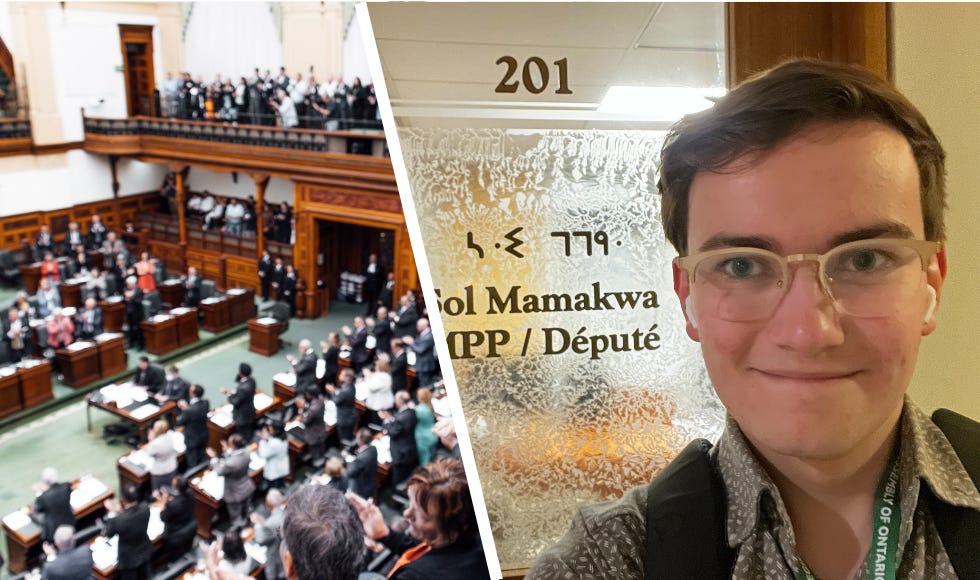Caleb Smolenaars (they/them), the Ontario NDP candidate for Oakville North–Burlington Credit: Photo supplied by the Ontario NDP
Happy Family Day! And, what better way to celebrate than with Caleb Smolenaars, the Ontario NDP candidate for Oakville North-Burlington, who comes from a proud labour family and understands the struggles that working class families face.
Caleb grew up in Oakville North–Burlington. It’s also where they first experienced the destructive cuts the Conservatives have been making to public education and where they became politically involved.
Caleb is an experienced community leader, human rights advocate, and progressive organizer. As a high school student, Caleb organized and led climate strikes. They coordinated fellow students as a provincial co-organizer for Students Say No, leading one of the largest student walkouts in Canadian history.
Currently at McMaster University taking Labour Studies, Caleb champions issues that matter as a Legislative Intern at Queen’s Park.
Caleb also advocates for the 2SLGBTQIA+ community of Halton and Hamilton as the creator and co-host of Beyond the Binary, a queer issues radio program on 93.3 FM CFMU Hamilton.
Caleb organized their workplace to successfully unionize over 200 coworkers with CUPE Local 3906 and is currently an elected Executive Committee Member for the union that serves McMaster University.
With their vast history of advocacy and organizing experience in labour, climate justice, and human rights organizations, Caleb is the change that Oakville North–Burlington has been waiting for and desperately needs.
Caleb sees a future where we protect the public services that make our province great, where we step up to lead the fight against climate change and where we build a future that the next generation can look forward to.
Caleb Smolenaars undertook a 12-week co-op as an MPP Intern in the offices of Official Opposition NDP MPPs Kristyn Wong-Tam and Sol Mamakwa. Credit: McMaster University Faculty of Social Sciences website
Caleb and I discuss multiple Ford manufactured crises including underfunding universities, healthcare and childcare. We also discuss issues that are impacting younger folks as well as those entering their mid 40s.
After seven long years of Doug Ford’s leadership, rent is exponentially higher than it has ever been and that’s directly attributable to Ford removing rent caps. Rent caps under Ford theoretically apply to rental units built and first occupied before November 15, 2018. Those built after that date are not subject to rent control. Yumna and Khadeja Farooq found out how precarious renting can be when after three years their landlord increased the rent on their Toronto condo from $2,500 to $9,500 per month.
However, that’s not the whole picture. Century old homes and rental units across the province that have undergone renovations since 2018 no longer qualify for rent control which limits annual rent increases to 2.5 per cent. However, above-guideline increases (AGIs) let any landlord apply for an exemption to the provincial rent increase guidelines and the criteria are extremely lax. According to the Canadian Centre for Policy Alternatives (CCPA), “AGIs have been a key driver of landlords’ efforts to hollow out Ontario’s rent control system.”
Protesting above guideline increases Credit: The CCPA report, Above-guideline increases are out of control
Just as important is the fact that, when one tenant moves out and a new one moves in, landlords can increase the rent as much as they want with some folks reporting 35 per cent increases or more. And, that includes units which fall under provincial rent control.
Historically, affordable meant 30 per cent of a household’s income was spent on rent. Folks looking to buy a home, would generally consider homes in a price range equal to about two and a half times their annual income.
I can hear all of those millennials, gen X’s and gen Z’s gasping because that is clearly not their reality. Their reality is so much harsher. The average Ontario worker makes about $56,000 annually before taxes. So, when you are renovated into an unfair rent hike which eats up over 50 per cent of your pay, it’s impossible to cover expenses including childcare, transportation, food and still set aside some savings from the remaining $28,000. Likewise purchasing a traditional “workers’ home” means spending over $1 million making home ownership for the average Ontarian virtually impossible.
The Ontario NDP is campaigning on a promise to implement real rent control including closing the loophole that exempts units built after 2018 and ending above-guideline rent increases.
The NDP will crack down on renovictions, demovictions and other illegal tactics that drive rents up. The Ontario NDP will also invest in affordable housing with co-ops and public models. Caleb explains how these NDP policies will create meaningful change for renters and folks who want to own a home in Ontario.
With basic staples like butter costing $8 per pound, three bags of milk $8 and a 750 gram box of breakfast cereal coming in at over $6, life is unaffordable. Let’s be clear, these high prices are due to price gouging by the three major food retailers – Loblaws, Sobeys, and Metro – and not necessarily due to increased supplier costs or shortages.
But the NDP have a plan to create a monthly grocery rebate that will help millions of Ontario families offset rising grocery costs with a monthly grocery rebate based on household income and size.
That means a family of four with a household income of $65,000 would receive about $122 a month. A family of four with a household income of $91,000 would receive about $75 a month.
The NDP plan to stop price gouging and bring transparency to grocery prices by requiring large retailers to publicly disclose any price increases over two per cent in a given week.
The NDP would also establish a new consumer watchdog to ensure fair food prices by cracking down on price fixing, addressing unfair practices, and enforcing competition laws.
This NDP plan would help parents who have been unable to purchase fresh fruits and vegetables and those who have been passing on expensive proteins like beef and chicken. These NDP policies would increase food affordability for middle and lower income families across the province.
Marit Stiles and the Ontario NDP have a plan to rebuild a stronger, fairer Southwest region that includes 24/7 emergency services restored at hospitals that have lost these services.
In 2018, Ford promised to end hallway medicine. Instead, Ford made it exponentially worse by diverting public funds to private for-profit clinics, hospitals and nursing agencies while further privatizing home care. The Ontario NDP plan will end hallway medicine by reinvigorating a robustly funded universal healthcare system. Marit Stiles will also eliminate parking fees at hospitals for staff, visitors and patients.
Caleb and the Ontario NDP recognize building commuting infrastructure is important given the climate crisis, cost of living and grid lock. The NDP have committed to GO rail improvements and transit expansions to keep Ontarians connected. The NDP will make commuting across the region more affordable, reliable and convenient by expanding intercity bus and rail transit.
Right now, $10 a day childcare is on the minds of many Ontario parents. After years of delays by the Ford government, the Ontario NDP want to create 53,000 new, public not-for-profit affordable childcare spaces. They will also establish a regional waitlist to make it easier to find quality childcare closer to home. Affordable childcare is another way the NDP is defending jobs and ensuring women can support their families.
When folks hear that the NDP want to tax the wealthy to cover these essential public services, some recoil. I’m always amazed when folks with a household income of $100,000 think they are wealthy. Being middle class in Ontario means an individual earns between $53,359 and $106,717 (2024). But that doesn’t really hold water these days because even folks making $250,000 can’t afford $1 million “worker” home. You would need an annual household income of $400,000 to realistically purchase that $1 million “worker” home based on 2.5 times your income.
Pay breakdown of the 100 highest-paid CEO’s in 2023 Credit: The CCPA report, Company Men: CEO Pay in Canada in 2023
According to Wealth Management Canada, the top 1% of “rich” Canadians had an annual income of $512,000 (2020) with many making use of tax loop holes by receiving additional compensation in the form of stock options and shares.
The CCPA report, Company Men: CEO Pay in Canada in 2023, revealed the top 100 CEOs earned an average 210 times more than the average worker.
The highest-paid CEOs – three women and 97 men – took home, on average, $13.2 million. This is the third best showing with CEOs taking home an average above $14 million in 2021 and 2022.
Find out what CEOs and Conservative MPPs have in common.
These are the people that the NDP want to hit with a wealth tax — not tradespeople nor middle income families.
Oakville North-Burlington is where Caleb Smolenaars grew up in a proud labour family that understands the struggles working class families face. Credit: Photo supplied by the Ontario NDP
Hear what Caleb Smolenaars has to say about the comprehensive Ontario NDP plan that’s bringing the fresh change Ontarians are looking for along with substantive policies to make those changes reality.
Make the time to critically compare all the party platforms and policies and find out how your MPP actually voted on important issues — voting records speak volumes over media soundbits.
Make an informed choice to create a more equitable Ontario when you vote on Thursday, February 27.
Read the full NDP plan for Southwest Ontario & Niagara and discover how investing in housing, transit, everyday essentials and families gives everyone a shot at a better future.
Order a sign and find out more at calebsmolenaars.ontariondp.ca
Thanks to everyone who read today’s article and listened to my podcast. With your continued support, a little Nicoll can make a lot of change.
Music: Real Estate by UNIVERSFIELD is licensed under a Attribution 4.0 International License. freemusicarchive.org.
*Be sure to download the Substack app to get the most from your podcast experience.

















Share this post